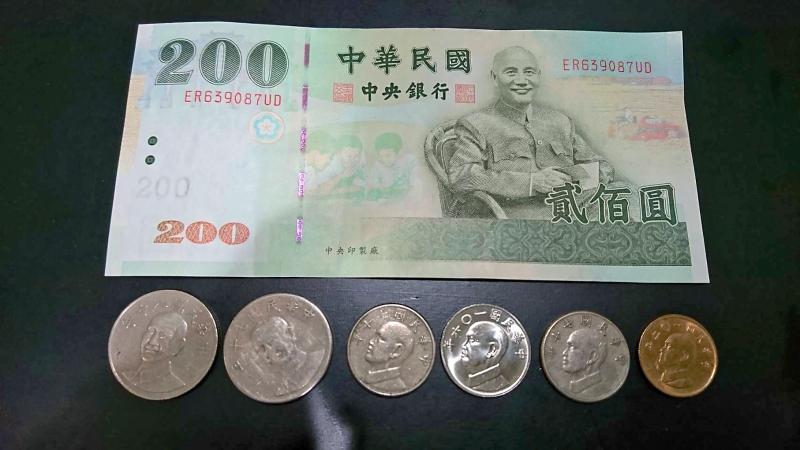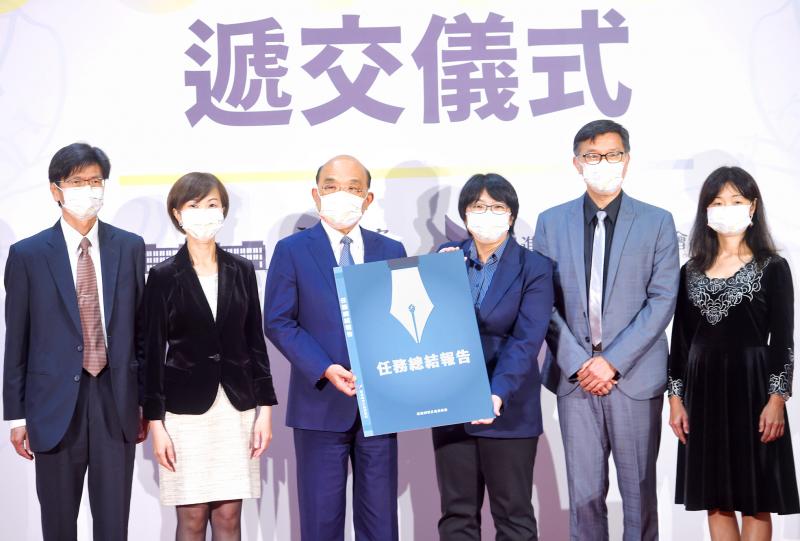Chiang Kai-shek (蔣介石) should be removed from Taiwanese banknotes and coins, the Transitional Justice Commission said in its final report as the ministy-level organization prepares to close tomorrow.
Chiang’s likeness should be removed from coins and notes when the central bank carries out a redesign of the nation’s currency, said the report, an official copy of which was handed to Premier Su Tseng-chang (蘇貞昌) by the commission’s acting minister Yeh Hung-ling (葉虹靈) at a ceremony in Taipei on Friday.
Images of Chiang are on NT$1 and NT$5 coins, and NT$200 banknotes.

Photo: Chen Yu-fu, Taipei Times
Citing the findings of two expert panels that the commission organized in 2019, the report said the purpose of currency design is to promote symbols and values that unify the nation and represent it to the outside world.
The prominence of Chiang and Sun Yat-sen (孫逸仙) on money suggests an overemphasis on political leadership and the glorification of “strongmen,” which is at odds with democratic norms, it said.
Chiang’s “dictatorial” reign was responsible for “undermining the democratic constitutional order, utilizing state violence and human rights infringements,” it said.

Photo: Fang Pin-chao, Taipei Times
Putting Chiang on coins and banknotes implies that an authoritarian ruler is the nation’s unifying symbol and that his regime represents its values, the report said.
The government has a legal responsibility to remove authoritarian symbols under the Act on Promoting Transitional Justice (促進轉型正義條例), which supersedes the central bank’s concerns about costs, it said.
Coins and banknotes bearing Chiang’s image should be taken out of circulation and replaced with new designs to be selected via an appropriate process that enables civic participation, the report said.
The replacement designs should underscore the nation’s cultural distinctiveness, natural landscape and the progressive values of cultural diversity, gender equality and environmentalism, it said.
The process should be conducted bearing in mind the need to facilitate societal dialogue and the formation of national identity, it said.
The report also made three suggestions regarding the Chiang Kai-shek Memorial Hall in Taipei.
The statue of Chiang at the hall should be relocated, the function and appearance of the hall should be altered and anything in the park related to the “worship” of authoritarian figures should be removed, it said.
Additional reporting by CNA

CHAOS: Iranians took to the streets playing celebratory music after reports of Khamenei’s death on Saturday, while mourners also gathered in Tehran yesterday Iranian Supreme Leader Ayatollah Ali Khamenei was killed in a major attack on Iran launched by Israel and the US, throwing the future of the Islamic republic into doubt and raising the risk of regional instability. Iranian state television and the state-run IRNA news agency announced the 86-year-old’s death early yesterday. US President Donald Trump said it gave Iranians their “greatest chance” to “take back” their country. The announcements came after a joint US and Israeli aerial bombardment that targeted Iranian military and governmental sites. Trump said the “heavy and pinpoint bombing” would continue through the week or as long

TRUST: The KMT said it respected the US’ timing and considerations, and hoped it would continue to honor its commitments to helping Taiwan bolster its defenses and deterrence US President Donald Trump is delaying a multibillion-dollar arms sale to Taiwan to ensure his visit to Beijing is successful, a New York Times report said. The weapons sales package has stalled in the US Department of State, the report said, citing US officials it did not identify. The White House has told agencies not to push forward ahead of Trump’s meeting with Chinese President Xi Jinping (習近平), it said. The two last month held a phone call to discuss trade and geopolitical flashpoints ahead of the summit. Xi raised the Taiwan issue and urged the US to handle arms sales to

State-run CPC Corp, Taiwan (CPC, 台灣中油) yesterday said that it had confirmed on Saturday night with its liquefied natural gas (LNG) and crude oil suppliers that shipments are proceeding as scheduled and that domestic supplies remain unaffected. The CPC yesterday announced the gasoline and diesel prices will rise by NT$0.2 and NT$0.4 per liter, respectively, starting Monday, citing Middle East tensions and blizzards in the eastern United States. CPC also iterated it has been reducing the proportion of crude oil imports from the Middle East and diversifying its supply sources in the past few years in response to geopolitical risks, expanding

Pro-democracy media tycoon Jimmy Lai’s (黎智英) fraud conviction and prison sentence were yesterday overturned by a Hong Kong court, in a surprise legal decision that comes soon after Lai was jailed for 20 years on a separate national security charge. Judges Jeremy Poon (潘兆初), Anthea Pang (彭寶琴) and Derek Pang (彭偉昌) said in the judgement that they allowed the appeal from Lai, and another defendant in the case, to proceed, as a lower court judge had “erred.” “The Court of Appeal gave them leave to appeal against their conviction, allowed their appeals, quashed the convictions and set aside the sentences,” the judges